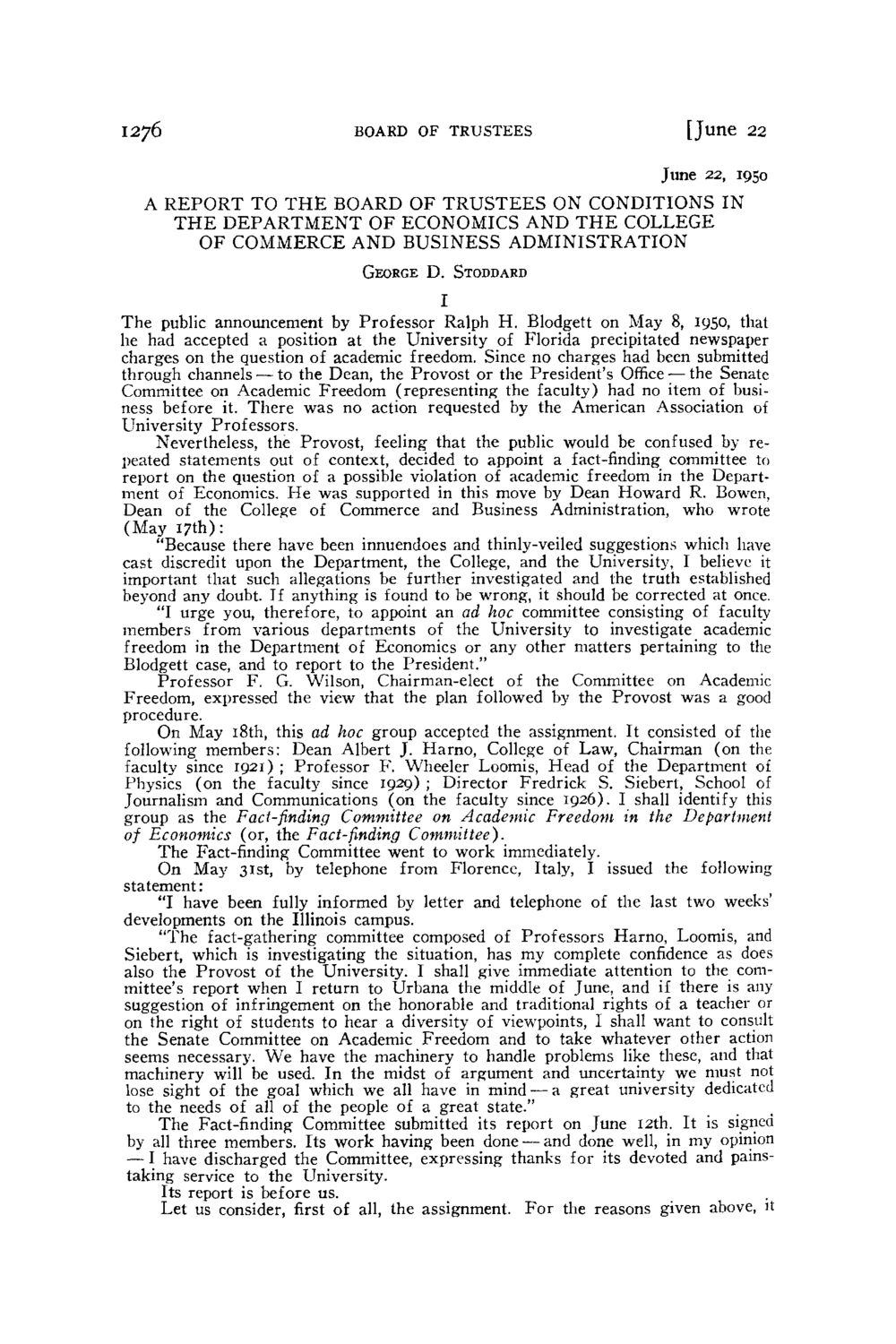| |
| |
Caption: Board of Trustees Minutes - 1950
This is a reduced-resolution page image for fast online browsing.

EXTRACTED TEXT FROM PAGE:
1276 BOARD OF TRUSTEES [June 22 June 22, 1950 A R E P O R T TO T H E BOARD OF T R U S T E E S ON C O N D I T I O N S IN T H E D E P A R T M E N T OF ECONOMICS AND T H E COLLEGE OF COMMERCE AND BUSINESS ADMINISTRATION GEORGE D. STODDARD I The public announcement by Professor Ralph H. Blodgett on May 8, 1950, that he had accepted a position at the University of Florida precipitated newspaper charges on the question of academic freedom. Since no charges had been submitted through channels — to the Dean, the Provost or the President's Office — the Senate Committee on Academic Freedom (representing the faculty) had no item of business before it. There was no action requested by the American Association of University Professors. Nevertheless, the Provost, feeling that the public would be confused by repeated statements out of context, decided to appoint a fact-finding committee to report on the question of a possible violation of academic freedom in the Department of Economics. H e was supported in this move by Dean Howard R. Bowen, Dean of the College of Commerce and Business Administration, who wrote (May 17th): "Because there have been innuendoes and thinly-veiled suggestions which have cast discredit upon the Department, the College, and the University, I believe it important that such allegations be further investigated and the truth established beyond any doubt. If anything is found to be wrong, it should be corrected at once. "I urge you, therefore, to appoint an ad hoc committee consisting of faculty members from various departments of the University to investigate academic freedom in the Department of Economics or any other matters pertaining to the Blodgett case, and to report to the President." Professor F. G. Wilson, Chairman-elect of the Committee on Academic Freedom, expressed the view that the plan followed by the Provost was a good procedure. On May 18th, this ad hoc group accepted the assignment. It consisted of the following members: Dean Albert J. Harno, College of Law, Chairman (on the faculty since 1921) ; Professor F . Wheeler Loomis, Head of the Department of Physics (on the faculty since 1929) ; Director Fredrick S. Siebert, School of Journalism and Communications (on the faculty since 1926). I shall identify this group as the Fact-finding Committee on Academic Freedom in the Department of Economics (or, the Fact-finding Committee). The Fact-finding Committee went to work immediately. On May 31st, by telephone from Florence, Italy, I issued the following statement: "I have been fully informed by letter and telephone of the last two weeks' developments on the Illinois campus. "The fact-gathering committee composed of Professors Harno, Loomis, and Siebert, which is investigating the situation, has my complete confidence as does also the Provost of the University. I shall give immediate attention to the committee's report when I return to Urbana the middle of June, and if there is any suggestion of infringement on the honorable and traditional rights of a teacher or on the right of students to hear a diversity of viewpoints, I shall want to consult the Senate Committee on Academic Freedom and to take whatever other action seems necessary. W e have the machinery to handle problems like these, and that machinery will be used. In the midst of argument and uncertainty we must not lose sight of the goal which we all have in mind — a great university dedicated to the needs of all of the people of a great state." The Fact-finding Committee submitted its report on June 12th. It is signed by all three members. Its work having been done — and done well, in my opinion — I have discharged the Committee, expressing thanks for its devoted and painstaking service to the University. Its report is before us. Let us consider, first of all, the assignment. F o r the reasons given above, it
| |